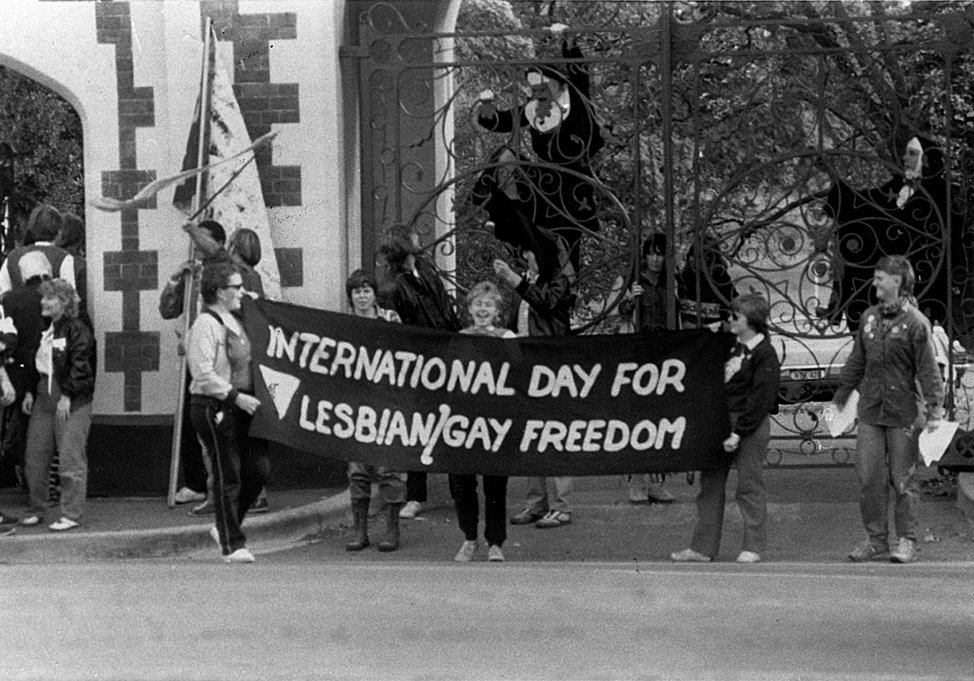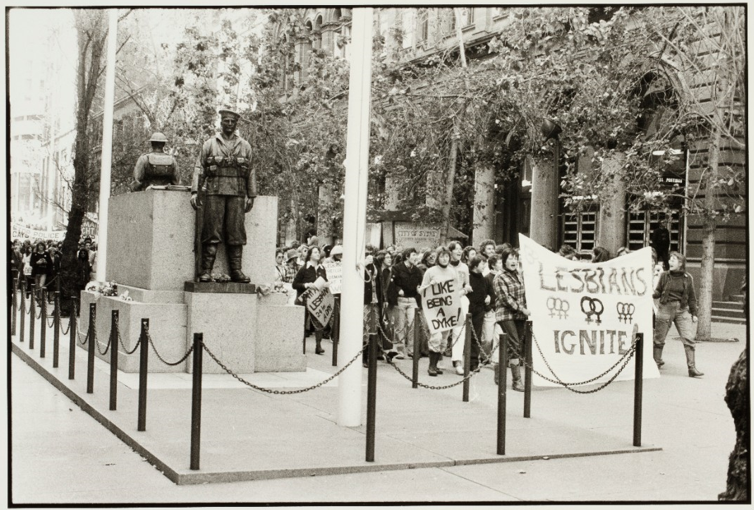Statement of Purpose
The Lesbian Action Group is based in Victoria, Australia. We are a group of lesbians who remember the days in the ‘70s, ‘80s and early ‘90s when there was a thriving lesbian community. You could go out any night of the week and find lesbian pubs, clubs, dances, balls, pool nights, dinner nights, sports teams, bookshops, cafes and even a lesbian adult shop. Some of these spaces have been documented in the Lost Lesbian Spaces project.
We have witnessed the demise of our culture and lesbian space since the early 1990s; either made extinct or subsumed under the mantle of “queer”. This is in part because of the rise of mainstream LGBTIQ+ and also because of diversity and inclusion laws which currently make it illegal for lesbians to hold public female-only functions without applying for an exemption with the Human Rights Commission.
In the early 2000s, lesbians applied for exemptions in order to run lesbian-only events. These were not successful, and the process became very stressful and expensive, and so we gave up. It was easier to go underground and become invisible and organise events through a closed network just as the gay and lesbian community used to do pre-1970s.
So for the past twenty odd years, the lesbian community in Victoria has existed underground.
The irony of this is that we can now legally marry, but can’t legally assemble in single-sex space.
Mainstream LGBTIQ+ organisations and Government have force-teamed us with people of the opposite-sex. There was no consultation or negotiation in this process. Lesbians are not able to legally come together, as a minority group, to socialise and have our own culture and events. This is in contrast to gay men with The Laird and Peel Hotels in Victoria being granted ongoing single-sex exemptions (which we support). And in contrast to trans-only events, which are widespread.
Image credit: Heritage Victoria
Lesbians are by definition females who are same-sex attracted, and exclusively so. While we socialise broadly with people of both sexes and all backgrounds and identities, there are specific contexts in which we insist on our right to single-sex spaces and therefore to exclude male persons. These include contexts involving intimate settings or where relationships are being sought, since, as lesbians, we do not seek intimate relationships with males, whatever identity they may claim. Transwomen are by definition males, and therefore our right to exclude male persons in intimate settings applies also to them, not because they are transwomen, but because they are males.
“What we are doing in applying for this exemption is saying we have boundaries and we would like our boundaries to be respected. Just as we respect the right of trans people to have trans-only events, we would like to be afforded the same right and respect for having our own events. “
Before the rise of the LGBTIQ+ movement, when it was just the gay and lesbian community, gay men had their spaces and lesbians had our spaces and we respected the need for each group to have our own spaces and we happily came together in mixed spaces. This is all we want again.
The Exemption Application
Their application for the exemption is so they can run lesbian-only events again. They are tired of living in the shadows and being underground. They are also really concerned that young lesbians have no community or lesbian-only spaces in which to socialise and meet potential partners. They have not had the benefit older lesbians have had pre- 1990s and they are finding it hard to find lesbian community when everything LGBTIQ+ is compulsory mixed sex. We know young lesbians who are finding this to be a major issue.
They are hoping the Human Rights Commission can acknowledge that we need our own space, just as Muslim women have been granted exemptions to have female only swimming events, just as women’s refuges and domestic violence shelters have been granted single sex status, just as men’s only clubs are granted single sex status it is important that lesbians are afforded our own single-sex spaces too.
See their exemption application here.
The argument for single sex space
In 2023, lesbians must hold closed, secret private events by invitation-only to be able to ensure that their events are female-only.
Compare this with female-only gyms, which are exempt because the Anti-Discrimination Tribunal has ruled they can be exempt. The tribunal was convinced that women who need to access these health services might not walk in the door if men are inside.
Lesbians also need to be afforded a permanent exemption in order to participate in single-sex spaces.
Image credit: The Dictionary of Sydney
The Appeal
LAG’s exemption application was denied by the Australian Human Rights Commission so LAG appealed through the Administrative Appeals Tribunal.
A two day hearing was held at the AAT in September 2024 and LAG’s exemption was again denied by the AAT.
Federal Court
In August 2025 LAG was an intervener in the Giggle vs Tickle case at the Federal Court in Sydney. You can read about this on the LAG website and see their submission here.
In February 2026, LAG’s case will be heard by the Federal Court in Melbourne.
Our Rights
Australia is a party to seven core international human rights treaties which cover lesbian rights as follows:
International Covenant on Economic, Social and Cultural Rights, Articles 15.1(a), 25(c) - right to participate in cultural life, right of access to public services for equality.
International Covenant on Civil and Political Rights, Articles 17, 19(2), 21, 22, 26, 27 - freedom of expression, oral, written on all media, the right not to be subjected to unlawful attacks on honour and reputation, the right not to be discriminated against based on sex, which includes same-sex sexual orientation, and equal protection under the law, and freedoms of peaceful assembly and association with own cultural group and equal protection under the law to do so.
International Covenant on Civil and Political Rights, Article 26 - the right not to be discriminated against based on sex, which includes same-sex sexual orientation, and equal protection under the law.
AND Article 17 - the right not to be subjected to unlawful attacks on honour and reputation.
AND Article 19.2 - freedom of expression, oral, written, media.
AND Article 21, 22, 26, 27 - freedoms of peaceful assembly and association with own cultural group, and equal protection under the law to do so.
OUR RIGHTS under CEDAW - the Convention on the Elimination of All Forms of Discrimination Against Women, Article 1 – the right of women not to have restrictions placed on them based on their sex, which nullify their fundamental human rights to enjoy freedoms in political, economic, social, cultural, civil or any other field.
AND Article 2(b)(c) - the right for women to have laws that protect them by prohibiting discrimination against women, and competent government and public officials who are effective at protecting women from discrimination.
AND Article 3 - States are to promote the advancement of women and their enjoyment of fundamental freedoms across all political, economic, social, cultural, civil or any other fields.48
AND under the International Covenant on Civil and Political Rights, Articles 21, 22, 26, 27 - the right not to be discriminated against based on sex, freedoms of peaceful assembly and association within own cultural group, and equal protection under the law to do so.
Image credit: David Urquhart
Previous exemptions applied for lesbian-only events
• 2023: There have been NO single-sex exemptions granted to lesbian women to be able to hold public events solely for their distinct group in the last twenty years in Australia. Although lesbians should be entitled to exceptions and special measures because they are a disadvantaged minority group, these provisions under human rights and equality laws do not prevent males from attending lesbian events. This is inequality and discrimination against lesbians, as other cultural, religious, and disadvantaged groups are permitted permanent exceptions and special measures to hold public gatherings for their groups. Examples of this have included a trans-only swimming event and sex-specific religious events for women and men.
• 2023: There were NO single-sex female-only exemptions granted for lesbian women in New South Wales between 2019 and 2023 by the Anti-Discrimination NSW.
• 2022: Jessica Hoyle, Tasmanian lesbian, who had applied for an exemption to hold a single-sex event in Launceston for lesbian women had her application refused yet again, on appeal to TASCAT Tribunal, on the basis that granting the exemption would discriminate against trans women. This tribunal’s decision also did not take into consideration that same-sex attracted lesbians are a disadvantaged minority group with the need to have public gatherings that are solely for their group. This decision discriminates against lesbian women.
• 2022: Jessica Hoyle v Tasmanian Anti-discrimination Commissioner. Jessica Hoyle, a Tasmanian lesbian, appealed the decision made to refuse an exemption to hold a single-sex event in Launceston for lesbian women. The TASCAT Tasmanian Tribunal upheld the anti-discrimination commissioner’s decision.
• 2021: Jessica Hoyle, a Tasmanian lesbian, applied for an exemption to hold a single-sex event in Launceston for lesbian women. This exemption was refused by the anti-discrimination commissioner on the basis that this would discriminate against transwomen. Anti-discrimination Commissioner, Sarah Bolt, did not take into consideration that Ms Hoyle as a lesbian woman is a part of a disadvantaged minority group in our society when making her decision to refuse the exemption. This decision discriminates against lesbian women.
• 2020: Hobart City Council granted an exemption to employ a female artist for their Urban Wall 2021 project.
• 2019: Cooper Screen Academy in Tasmania granted a single-sex exemption for female-only acting group.
• 2019: Throughout Tasmania there were no single-sex female-only exemptions granted to lesbian women between 2019 and 2023.
• 2017: A group of lesbians privately asked for one room to be allocated for women only in the new Victorian Pride Centre. This is deemed to be transphobic and was refused.
• 2009: Ascot Vale Leisure Centre, Victoria was granted an exemption to offer women-only swimming sessions to enable Muslim women to participate. See Ascot Vale Leisure Centre (Anti-Discrimination Exemption) [2009] VCAT 765.
• 2006 – 2009: Sappho’s Party, a South Australian lesbian group, were taken to the Sex Discrimination Tribunal by a trans-identifying male because he was refused a ticket to their lesbian-only event. See O’Keefe v Sappho’s Party Inc [2009] SAEOT 50.
• 2003: Sally Goldner, the co-founder of Transgender Victoria, took the organisers of Lesbian Festival 2004 to the Equal Opportunity Commission of Victoria for advertising that the forthcoming festival was for Lesbians Born Female only. The women managed to get an exemption from the Victorian CAT Tribunal, but it was later overturned and faced with the possibility of litigation by the transgender community, LesFest 2004 was officially cancelled, and a private party was held instead.
Male Exemptions granted
Male-only clubs such as the Sydney and Melbourne Clubs are exempt altogether from the Equal Opportunity Act. “By law, they are not considered discriminatory, and do not have to go through any of the processes that organisations like a women only golf club do in order to be allowed to continue operating.”
2008 Peel Hotel Single Sex exemption granted for three years.
In 1998 The Laird and Club 80 were granted ‘Male-only’ status by the Victorian Civil and Administrative Tribunal (VCAT) in deference to their history and service to the gay community. While they still maintain this status, a few times a year they open the doors to the community for events such as Vic Leather Open Day (May), Men on Men Open Day (June) and Northside Bizarre (October).
Contact the Lesbian Action Group (LAG) via their website at https://lesbianactiongroup.org.au/
For those wanting to know more, the following details a history of previous exemptions and exemption applications.



